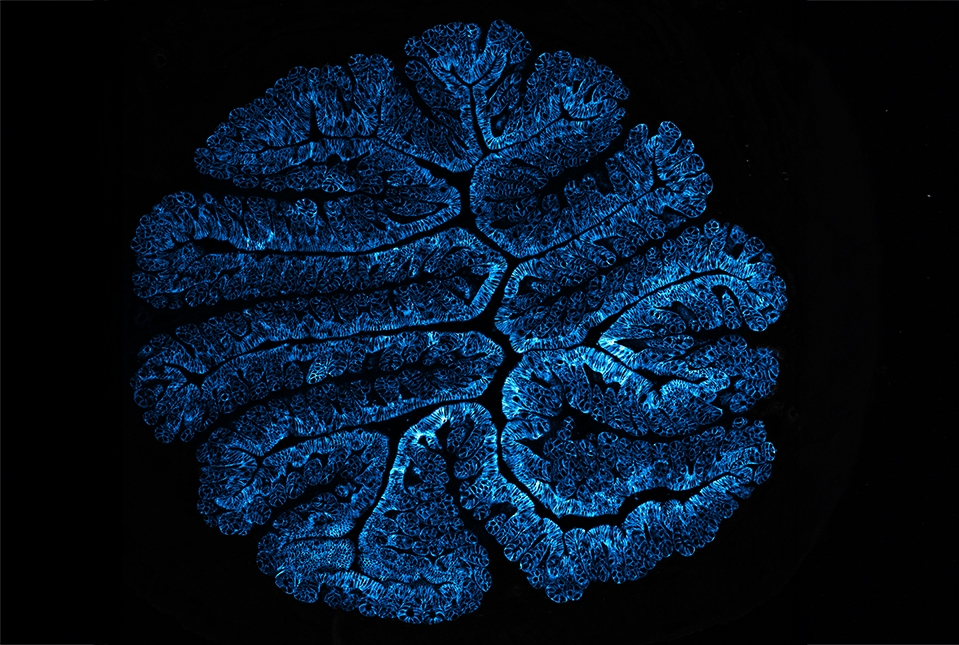Inulin, a type of fiber found in certain plant-based foods and fiber supplements, causes inflammation in the gut and exacerbates inflammatory bowel disease in a preclinical model, according to a new study by Weill Cornell Medicine investigators. The surprising findings could pave the way for therapeutic diets that may help ease symptoms and promote gut health.
The study, published March 20 in the Journal of Experimental Medicine, shows that inulin, which is found in foods like garlic, leeks and sunchoke, as well as commonly used fiber supplements and foods with added fiber, stimulates microbes in the gut to release bile acids that increase the production of molecules that promote intestinal inflammation. One such protein, called IL-33, causes immune cells called group 2 innate lymphoid cells (ILC2s) to become activated, triggering an excessive immune response similar to an allergic reaction. That excessive immune response then exacerbates intestinal damage and symptoms in an animal model of inflammatory bowel disease.

Dr. Mohammad Arifuzzaman (left) and Dr. David Artis (right).
Dietary fiber, including inulin, is considered an essential part of a healthy diet for most people. Gut microbes turn inulin and other types of dietary fiber into short-chain fatty acids that turn on immune cells called regulatory T cells, which help reduce inflammation and have other beneficial effects throughout the body. This led to a remarkable rise in use of dietary fiber as an additive in both foods and supplements, and purified inulin or inulin-rich chicory root is often the main source of the fiber.
“Inulin is now everywhere, from clinical trials to prebiotic sodas,” said lead author Dr. Mohammad Arifuzzaman, a postdoctoral associate at Weill Cornell Medicine. He and his colleagues expected that inulin would also have protective effects in inflammatory bowel disease. But they found just the opposite.
Feeding inulin to mice in the context of a model of inflammatory bowel disease increased the production of certain bile acids by specific groups of gut bacteria. The increased bile acids boosted the production of an inflammatory protein called IL-5 by ILC2s. The ILC2s also failed to produce a tissue-protecting protein called amphiregulin. In response to these changes, the immune system promotes the production of immune cells called eosinophils, which further ramp up inflammation and tissue damage. Previously, a 2022 study by the same team of investigators showed that this flood of eosinophils may help protect against parasite infections. However, in the inflammatory bowel disease model, this chain reaction exacerbated intestinal inflammation, weight loss and other symptoms like diarrhea.
In translational patient-based studies, the team also analyzed human tissue, blood and stool samples from Weill Cornell Medicine’s Jill Roberts Institute for Research in Inflammatory Bowel Disease Live Cell Bank. This analysis revealed that patients with inflammatory bowel disease, like the mice fed inulin, had higher levels of bile acids in their blood and stool and excessive levels of eosinophils in their intestine compared with people without the condition. The results suggest that the inflammation cascade similar to that in the mice fed inulin is already primed in humans with inflammatory bowel disease, and dietary uptake of inulin may further exacerbate the disease.
These unexpected discoveries may help explain why high-fiber diets often exacerbate inflammatory bowel disease in patients. It may also help scientists develop therapeutic diets to reduce symptoms and gut damage in patients with inflammatory bowel disease or related conditions. New therapies are urgently needed for these increasingly common gut conditions. Existing biologic therapies can increase the risk of developing infections or autoimmune diseases, which cause the immune system to attack the body.
“The present study show that not all fibers are the same in how they influence the microbiota and the body’s immune system,” said senior author Dr. David Artis, director of the Jill Roberts Institute for Research in Inflammatory Bowel Disease and director of the Friedman Center for Nutrition and Inflammation at Weill Cornell Medicine. "These findings could have broader implications for the delivery of precision nutrition to individual patients to promote their overall health based on their unique symptoms, microbiota composition and dietary needs."
Many Weill Cornell Medicine physicians and scientists maintain relationships and collaborate with external organizations to foster scientific innovation and provide expert guidance. The institution makes these disclosures public to ensure transparency. For this information, see profile for Dr. Artis.
The research reported in this story was funded in part by the National Institute of Allergy and Infectious Diseases, the National Institute of Diabetes and Digestive and Kidney Diseases, the Eunice Kennedy Shriver National Institute of Child Health and Human Development, the National Institute of General Medical Sciences, and the National Institute of Arthritis and Musculoskeletal and Skin Diseases, all part of the National Institutes of Health, through grant numbers K99AI173660, DP2HD101401, R35GM131877, DK126871, AI151599, AI095466, AI095608, AR070116, AI172027, DK132244). Additional support was provided by the Crohn’s & Colitis Foundation (grant numbers 851136, 937437, 901000); AGA Research Foundation; WCM Research Assistance for Primary Parents Initiative; The. W.M. Keck Foundation; the Howard Hughes Medical Institute; CURE for IBD; the Jill Roberts Institute for Research in IBD; Kenneth Rainin Foundation; the Sanders Family Foundation; Rosanne H. Silbermann Foundation, Linda and Glenn Greenberg; and the Allen Discovery Center Program, a Paul G. Allen Frontiers Group advised program of the Paul G. Allen Family Foundation.

